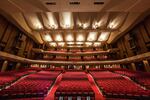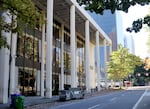
Keller Auditorium, in an undated handout image.
Jason Quigley / Courtesy of Portland’5 Centers for the Arts
Portland’s Keller Auditorium has housed some of the city’s most iconic performances from “The Lion King” to “Swan Lake.”
Since 1917, artists from around the world have come here to perform to often packed houses.
But after decades of showstoppers — from classic to contemporary — a seismic report from the city of Portland suggests that a powerful earthquake could seriously damage or even destroy the building.
Now the city is figuring out how to save the building.
Making buildings earthquake-proof
“In 2017 or so the city was in the process of working on implementing regulations that would require mandatory retrofits of known unreinforced masonry buildings and the Keller Auditorium as an unreinforced masonry rebuilding,” said Karl Lisle, the city of Portland’s manager of public projects.
According to Amit Kumar, the supervising engineer at the city’s Bureau of Development Services, buildings that meet that definition are “made from basically masonry, which is like clay brick or hollow concrete or stone mason.”
“If you take a piece of chalk and break it, it’ll just break. And it’s not even as strong as that because the mortar has deteriorated over time,” he said.
The city estimates there are over 1,600 unreinforced masonry buildings in Portland alone, ranging from small one-story public bathrooms to large residential buildings and venues like the Keller.
In the 1960s, the city renovated Keller to meet safety standards of the time.

The exterior of Keller Auditorium in Downtown Portland. A recent seismic study by the city revealed that the historic venue is in dire need of renovation.
Steven Tonthat / OPB
But those standards have evolved and now include earthquake precautions.
Ashley Streig is an associate professor of geology at Portland State University who specializes in earthquake geology.
“Here along the margins of the Pacific Northwest we have the subducting Juan de Fuca plate off to the west in the Pacific Ocean. And that dives beneath the North America plate that we all live on,” she said.
“There’s frictional contact between those two plates. And every few hundred years that friction is overcome. And that results in a release of the accumulated strain and, and an earthquake in the subduction zone.”
One way to understand the problem is to picture the edges of two dinner plates stacked on top of each other. Both are held together by friction.
If the plates are slowly pushed together, then the friction between them also increases.
When enough time passes, that friction will eventually release, with one plate sliding beneath the other.
In the geological world, the dinner plates example would actually be tectonic plates pushed together by years and years of gravitational force, and the explosive release could cause a powerful earthquake.
“And those happen roughly every 250 to 500 years. They’re really large magnitude events from magnitude 8.0 to a magnitude 9.0 which is the largest estimated currently,” Streig said.
Streig said that the last major earthquake of that magnitude struck the Pacific Northwest in 1700, 323 years ago. This means the region is currently in the middle of the pocket of time when another major earthquake could potentially strike.
And if it were to strike an unreinforced masonry building like Keller Auditorium, Streig said the results could be disastrous.
“If we were to have this earthquake tomorrow before these seismic retrofitting is complete on the Keller Auditorium, we can anticipate that Keller Auditorium will fail in that event,” she said.
What to do next
The city originally planned to release the seismic study report back in 2020, but due to the COVID-19 pandemic, the results were delayed.
Three years later, the report reveals that Keller Auditorium remains in dire need of many changes.
“We need to address so many other issues like ADA accessibility and deficiencies with all sorts of other things. There’s no kitchen in the building. The loading dock is totally insufficient,” Lisle said.

The front doors of Keller Auditorium in Downtown Portland. The historic venue is designated an unreinforced masonry building. A recent study by the city revealed that the building is in dire need of seismic upgrades.
Steven Tonthat / OPB
So what does all this mean for the Keller’s future?
That’s what the city of Portland aimed find out last year. City leaders reached out to local contractors to identify the best plans to save the building. Eight proposals were submitted.
Last month, the Halprin Landscape Conservancy presented one proposal to the City Council.
That proposal is to do an entire renovation of the Keller from top to bottom.
The report estimated the project to last roughly 28 months costing about $236 million. There’s also an expedited plan that will cost $267 million in 19 months.
“We’ve gotten 55 years out of the renovation in the late 1960s. We’re gonna want at least another 50. If we’re gonna put a hundred over a hundred million dollars in this building, we’re gonna want something that’s really gonna serve us well,” Lisle said.
But one of the biggest concerns many people have is where to hold the shows during construction.
Currently, there aren’t any other suitable venues for companies like the Portland Opera to house large shows on such a grand scale.
If and when the Keller were to go under construction, that would mean that there wouldn’t be any scheduled shows, or revenue, for at least two years.
Anne Francis, the vice president of the West Coast region of the company Broadway Across America, which is responsible for bringing touring Broadway shows to Portland, spoke at the September meeting.
“The span of closing Keller for 19 to 28 months and as a report states would impact two to three seasons worth of Broadway, not just one season. We strongly encourage the recommended economic analysis to take place to determine the true impact to the surrounding areas that would occur during a closure,” she said.
The city is also reviewing another option: Build a brand new Keller Auditorium at a different location.
“You can design everything to be state of the art and long lasting and efficient,” Lisle said.
Lisle adds that the cost of building the new auditorium would be around $300 million, but also said a new building would provide a unique advantage for Portland theater.
“You’d be able to use the current facility while you were building a new one,” he said.
Streig said while she appreciates Portland’s art scene and the revenue it brings to the city, the risks regarding Keller’s safety are too high.
“I’m not willing to walk into the Keller Auditorium with my child and watch a show because I understand what’s gonna happen to that structure, but that’s an individual assessment,” she said.
It’s important to note that no decision is currently being made. City officials are looking at two more proposals at the end of October and even then, they will have to take time to weigh their options.
“We’ll go through it together and kind of see what happens and hopefully come to a good decision that’s gonna serve the city and the region,” Lisle said.
So at least for now, the show will go on at the Keller.
